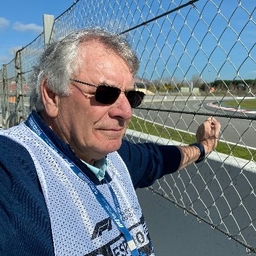
Gary Anderson
Writer at The Race
Former Jordan and Jaguar F1 technical director. https://t.co/NZFSZCI4M6
Articles
-
3 weeks ago |
telegraph.co.uk | Gary Anderson
Despite the regulation change, the top four teams have pretty much stayed exactly where they were, though it is difficult to judge fully after just one race. Given the flexi-wing change was announced several months ago, the teams would have been hard at work for a while, producing front wings that comply. In Imola, they would have run 90 per cent of what they would have used at Barcelona with the front wings. This was not a light-switch moment for any team.
-
4 weeks ago |
the-race.com | Gary Anderson
It’s only the end of the first day of the Spanish Grand Prix weekend, but it offers a glimpse of which Formula 1 teams may have benefitted, and which appear to have suffered most, from the flexi-wing technical directive. I have often said that sometimes you can out-trick yourself and when you are relying on front wing deflection between slow and high-speed corners to help balance the car it will be very difficult to get the optimum from it for all corner speeds.
-
4 weeks ago |
the-race.com | Gary Anderson
The long-awaited introduction of the flexi-wings technical directive for the Spanish Grand Prix weekend means there’s much excitement about Formula 1 teams' potential new front wing designs. But as mentioned in my earlier article about the more stringent front wing deflection tests, I am not expecting too much of a change in the geometry of the parts. That’s because any changes will be hidden within the wing structure and the carbon lay-up.
-
1 month ago |
the-race.com | Gary Anderson
How many Formula 1 teams will head to Barcelona for the Spanish Grand Prix on a 'wing' and a prayer? The reduction in the amount of flexibility permitted in the FIA's front wing tests kicks in and will undoubtedly hurt some teams more than others. The question is, who could lose out and who might gain? The rationale for the value of pursuing, and in some cases maximising, front wing flexing is clear. When the wing is in its starting position, it generates more front grip at lower speeds.
-
1 month ago |
the-race.com | Gary Anderson
The reasons for McLaren's good tyre management continue to be a major talking point in Formula 1. But rather than throwing around all sorts of questions and suspicions, rivals like Red Bull should perhaps spend more time thinking about the contribution of the rear suspension design. While it can be difficult to get a close look at these configurations, some revealing photos show a little more than normal and make it possible to understand the different approaches of the top four teams.
Try JournoFinder For Free
Search and contact over 1M+ journalist profiles, browse 100M+ articles, and unlock powerful PR tools.
Start Your 7-Day Free Trial →X (formerly Twitter)
- Followers
- 18K
- Tweets
- 624
- DMs Open
- No

That one was all Albon. He is feeling the pressure from Colapinto over the last few races

Lots of lateral tyre bouncing from the McLaren. That usually comes from low tyre pressures

RT @wearetherace: 🔎 @eddstrawF1 and @GaryAndersonF1 were both trackside during FP1 - and Gary has reported back some of his thoughts... htt…
